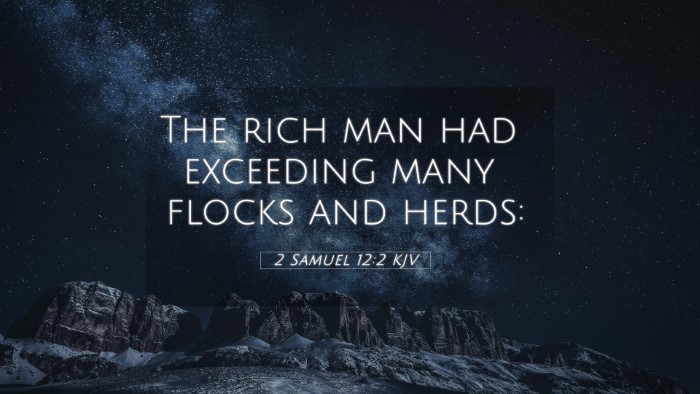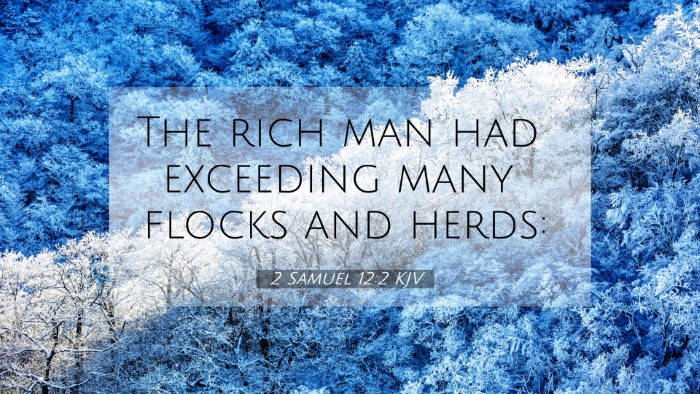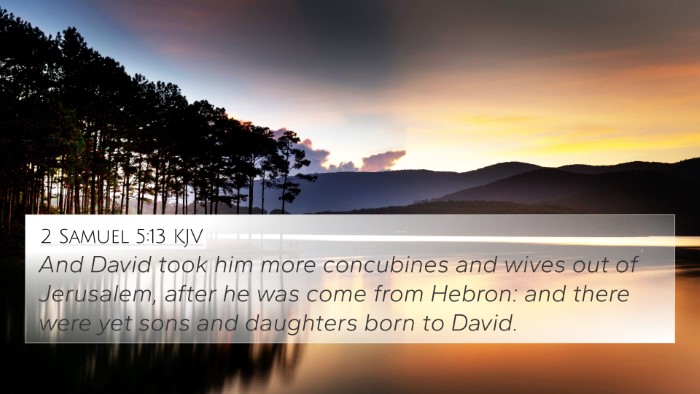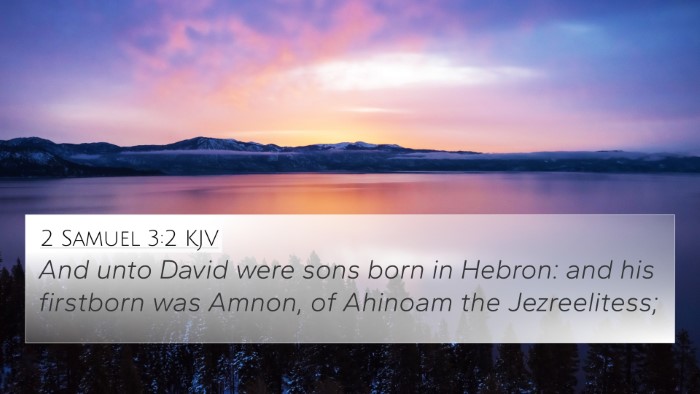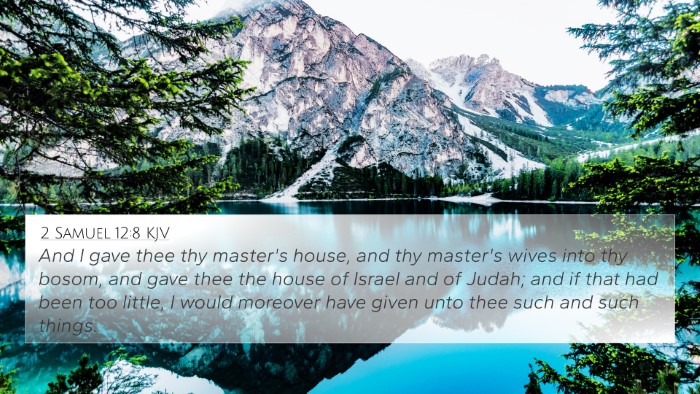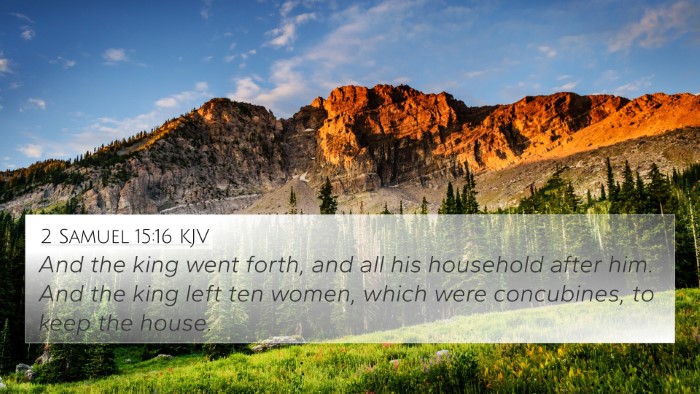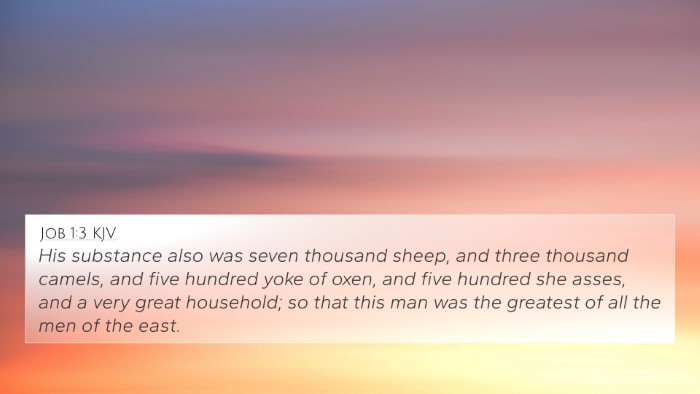Understanding 2 Samuel 12:2
The verse 2 Samuel 12:2 states, "The rich man had a very large number of sheep and cattle, but the poor man had nothing except one little ewe lamb he had bought." This verse is a critical component of the narrative of King David's sin and subsequent confrontation by the prophet Nathan. Below, we explore the meanings and connections of this verse as interpreted through various public domain commentaries, such as those by Matthew Henry, Albert Barnes, and Adam Clarke.
Contextual Overview
The surrounding context of 2 Samuel 12 illustrates the gravity of David's sin of adultery with Bathsheba and the arranged murder of her husband, Uriah. Nathan approaches David with a parable to highlight the seriousness of his actions and to bring him to repentance.
Commentary Insights
Matthew Henry's Commentary
Matthew Henry emphasizes the stark contrast between the rich man and the poor man in this parable. The rich man's wealth and the poor man's singular beloved lamb vividly represent God's care for the humble and oppressed. This metaphor aligns with the biblical theme that God values the meek, and David’s sin was not only morally wrong but also an abuse of power.
Albert Barnes' Notes
Albert Barnes elucidates the moral lesson embedded in this parable. He points out that the rich man, representing Israel's leaders who exploit the vulnerable, acted selfishly and ruthlessly. Barnes suggests that this narrative reflects God's justice against the exploitative actions of leaders, connecting David's judgment to the greater responsibility that comes with leadership.
Adam Clarke's Commentary
Adam Clarke offers a deeper theological perspective, analyzing the symbolic nature of the ewe lamb. He notes that the lamb symbolizes purity and innocence, which parallels Bathsheba's plight. Clarke reinforces that the parable is not a mere story but a divine indictment against David’s transgressions, leading to the ultimate revelation of God's law and justice.
Bible Verse Cross-References
Here are several pertinent Bible verses that relate directly to 2 Samuel 12:2, providing additional context and deeper understanding:
- Exodus 20:14: "You shall not commit adultery." This commandment underlines the moral framework that David violated.
- Psalm 51:4: "Against you, you only, have I sinned and done what is evil in your sight." David's acknowledgment of his sin reinforces the narrative of repentance.
- 1 Kings 14:10: "Therefore I am about to bring disaster on the house of Jeroboam." This establishes the consequences of leading others into sin.
- Luke 16:19-31: The parable of the rich man and Lazarus reflects similar themes of wealth disparity and divine justice.
- James 5:1-6: This passage warns the rich against oppressing the poor, resonating with the injustices highlighted in Nathan's parable.
- Matthew 18:12-14: Jesus' own teaching on the lost sheep underlines God’s concern for individuals, paralleling the poor man’s loss.
- Ezekiel 18:30: "Repent and live!" This insistence on repentance connects to Nathan's challenge to David.
Connections Between Bible Verses
The connections between 2 Samuel 12:2 and these referenced scriptures highlight the themes of justice, accountability, and God’s compassion for the oppressed. For those studying the Bible, linking Bible scriptures like these enrich understanding.
Comparative Bible Verse Analysis
Comparative analysis reveals that the parable employed by Nathan transcends time and offers insights into God's ongoing concern for justice. The contrast of rich and poor depicted in 2 Samuel 12:2 aligns with broader biblical themes found throughout both the Old and New Testaments.
Bible Verse Parallels
Furthermore, understanding 2 Samuel 12:2 creates a platform for exploring inter-Biblical dialogues. The moral implications and divine justice portrayed in this verse echo throughout scripture, urging readers to recognize the importance of ethical leadership and accountability.
Thematic Bible Verse Connections
In sum, 2 Samuel 12:2, with its emphasis on the disparity between the rich man's wealth and the poor man's singular possession, serves as a powerful reminder of the responsibilities of those in power. Thematically, it contributes to a broader understanding of justice that is threaded throughout the Bible.
Tools for Bible Cross-Referencing
For those seeking to dive deeper into their study, using effective tools for Bible cross-referencing can enhance your understanding of these connections. A Bible concordance or a Bible cross-reference guide can be invaluable in uncovering how different verses interact with and illuminate one another.
Conclusion
2 Samuel 12:2 is rich with meaning and implications, serving not only as a pivotal moment in David's life but also as a significant moral lesson for the Israelites and for modern readers. The layers of meaning offered through public domain commentaries provide a comprehensive understanding of the text, making it accessible for anyone seeking to explore the depths of the scriptures.

